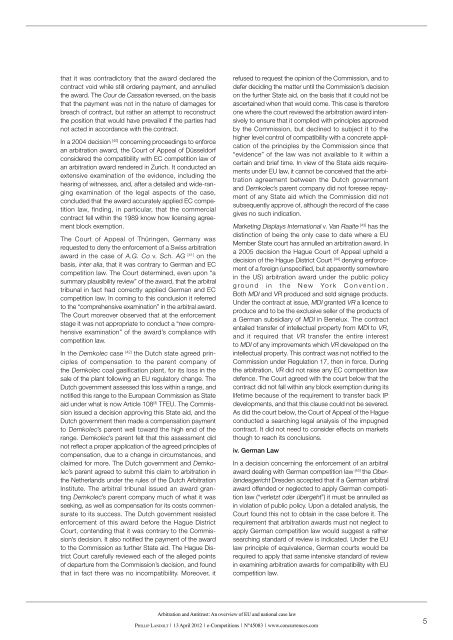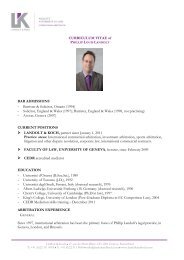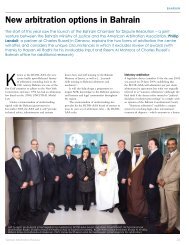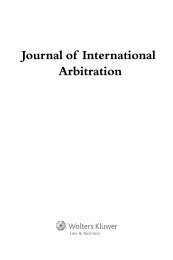Arbitration and Antitrust An overview of EU and national case law
Arbitration and Antitrust: An overview of EU and ... - Landolt & Koch
Arbitration and Antitrust: An overview of EU and ... - Landolt & Koch
- No tags were found...
You also want an ePaper? Increase the reach of your titles
YUMPU automatically turns print PDFs into web optimized ePapers that Google loves.
that it was contradictory that the award declared the<br />
contract void while still ordering payment, <strong>and</strong> annulled<br />
the award. The Cour de Cassation reversed, on the basis<br />
that the payment was not in the nature <strong>of</strong> damages for<br />
breach <strong>of</strong> contract, but rather an attempt to reconstruct<br />
the position that would have prevailed if the parties had<br />
not acted in accordance with the contract.<br />
In a 2004 decision [40] concerning proceedings to enforce<br />
an arbitration award, the Court <strong>of</strong> Appeal <strong>of</strong> Düsseldorf<br />
considered the compatibility with EC competition <strong>law</strong> <strong>of</strong><br />
an arbitration award rendered in Zurich. It conducted an<br />
extensive examination <strong>of</strong> the evidence, including the<br />
hearing <strong>of</strong> witnesses, <strong>and</strong>, after a detailed <strong>and</strong> wide-ranging<br />
examination <strong>of</strong> the legal aspects <strong>of</strong> the <strong>case</strong>,<br />
concluded that the award accurately applied EC competition<br />
<strong>law</strong>, finding, in particular, that the commercial<br />
contract fell within the 1989 know how licensing agreement<br />
block exemption.<br />
The Court <strong>of</strong> Appeal <strong>of</strong> Thüringen, Germany was<br />
requested to deny the enforcement <strong>of</strong> a Swiss arbitration<br />
award in the <strong>case</strong> <strong>of</strong> A.G. Co v. Sch. AG [41] on the<br />
basis, inter alia, that it was contrary to German <strong>and</strong> EC<br />
competition <strong>law</strong>. The Court determined, even upon “a<br />
summary plausibility review” <strong>of</strong> the award, that the arbitral<br />
tribunal in fact had correctly applied German <strong>and</strong> EC<br />
competition <strong>law</strong>. In coming to this conclusion it referred<br />
to the “comprehensive examination” in the arbitral award.<br />
The Court moreover observed that at the enforcement<br />
stage it was not appropriate to conduct a “new comprehensive<br />
examination” <strong>of</strong> the award’s compliance with<br />
competition <strong>law</strong>.<br />
In the Demkolec <strong>case</strong> [42] the Dutch state agreed principles<br />
<strong>of</strong> compensation to the parent company <strong>of</strong><br />
the Demkolec coal gasification plant, for its loss in the<br />
sale <strong>of</strong> the plant following an <strong>EU</strong> regulatory change. The<br />
Dutch government assessed this loss within a range, <strong>and</strong><br />
notified this range to the European Commission as State<br />
aid under what is now Article 108 (3) TF<strong>EU</strong>. The Commission<br />
issued a decision approving this State aid, <strong>and</strong> the<br />
Dutch government then made a compensation payment<br />
to Demkolec’s parent well toward the high end <strong>of</strong> the<br />
range. Demkolec’s parent felt that this assessment did<br />
not reflect a proper application <strong>of</strong> the agreed principles <strong>of</strong><br />
compensation, due to a change in circumstances, <strong>and</strong><br />
claimed for more. The Dutch government <strong>and</strong> Demkolec’s<br />
parent agreed to submit this claim to arbitration in<br />
the Netherl<strong>and</strong>s under the rules <strong>of</strong> the Dutch <strong>Arbitration</strong><br />
Institute. The arbitral tribunal issued an award granting<br />
Demkolec’s parent company much <strong>of</strong> what it was<br />
seeking, as well as compensation for its costs commensurate<br />
to its success. The Dutch government resisted<br />
enforcement <strong>of</strong> this award before the Hague District<br />
Court, contending that it was contrary to the Commission’s<br />
decision. It also notified the payment <strong>of</strong> the award<br />
to the Commission as further State aid. The Hague District<br />
Court carefully reviewed each <strong>of</strong> the alleged points<br />
<strong>of</strong> departure from the Commission’s decision, <strong>and</strong> found<br />
that in fact there was no incompatibility. Moreover, it<br />
refused to request the opinion <strong>of</strong> the Commission, <strong>and</strong> to<br />
defer deciding the matter until the Commission’s decision<br />
on the further State aid, on the basis that it could not be<br />
ascertained when that would come. This <strong>case</strong> is therefore<br />
one where the court reviewed the arbitration award intensively<br />
to ensure that it complied with principles approved<br />
by the Commission, but declined to subject it to the<br />
higher level control <strong>of</strong> compatibility with a concrete application<br />
<strong>of</strong> the principles by the Commission since that<br />
“evidence” <strong>of</strong> the <strong>law</strong> was not available to it within a<br />
certain <strong>and</strong> brief time. In view <strong>of</strong> the State aids requirements<br />
under <strong>EU</strong> <strong>law</strong>, it cannot be conceived that the arbitration<br />
agreement between the Dutch government<br />
<strong>and</strong> Demkolec’s parent company did not foresee repayment<br />
<strong>of</strong> any State aid which the Commission did not<br />
subsequently approve <strong>of</strong>, although the record <strong>of</strong> the <strong>case</strong><br />
gives no such indication.<br />
Marketing Displays Inter<strong>national</strong> v. Van Raalte [43] has the<br />
distinction <strong>of</strong> being the only <strong>case</strong> to date where a <strong>EU</strong><br />
Member State court has annulled an arbitration award. In<br />
a 2005 decision the Hague Court <strong>of</strong> Appeal upheld a<br />
decision <strong>of</strong> the Hague District Court [44] denying enforcement<br />
<strong>of</strong> a foreign (unspecified, but apparently somewhere<br />
in the US) arbitration award under the public policy<br />
g r o u n d i n t h e N e w Yo r k C o n v e n t i o n .<br />
Both MDI <strong>and</strong> VR produced <strong>and</strong> sold signage products.<br />
Under the contract at issue, MDI granted VR a licence to<br />
produce <strong>and</strong> to be the exclusive seller <strong>of</strong> the products <strong>of</strong><br />
a German subsidiary <strong>of</strong> MDI in Benelux. The contract<br />
entailed transfer <strong>of</strong> intellectual property from MDI to VR,<br />
<strong>and</strong> it required that VR transfer the entire interest<br />
to MDI <strong>of</strong> any improvements which VR developed on the<br />
intellectual property. This contract was not notified to the<br />
Commission under Regulation 17, then in force. During<br />
the arbitration, VR did not raise any EC competition <strong>law</strong><br />
defence. The Court agreed with the court below that the<br />
contract did not fall within any block exemption during its<br />
lifetime because <strong>of</strong> the requirement to transfer back IP<br />
developments, <strong>and</strong> that this clause could not be severed.<br />
As did the court below, the Court <strong>of</strong> Appeal <strong>of</strong> the Hague<br />
conducted a searching legal analysis <strong>of</strong> the impugned<br />
contract. It did not need to consider effects on markets<br />
though to reach its conclusions.<br />
iv. German Law<br />
In a decision concerning the enforcement <strong>of</strong> an arbitral<br />
award dealing with German competition <strong>law</strong> [45] the Oberl<strong>and</strong>esgericht<br />
Dresden accepted that if a German arbitral<br />
award <strong>of</strong>fended or neglected to apply German competition<br />
<strong>law</strong> (“verletzt oder übergeht”) it must be annulled as<br />
in violation <strong>of</strong> public policy. Upon a detailed analysis, the<br />
Court found this not to obtain in the <strong>case</strong> before it. The<br />
requirement that arbitration awards must not neglect to<br />
apply German competition <strong>law</strong> would suggest a rather<br />
searching st<strong>and</strong>ard <strong>of</strong> review is indicated. Under the <strong>EU</strong><br />
<strong>law</strong> principle <strong>of</strong> equivalence, German courts would be<br />
required to apply that same intensive st<strong>and</strong>ard <strong>of</strong> review<br />
in examining arbitration awards for compatibility with <strong>EU</strong><br />
competition <strong>law</strong>.<br />
<strong>Arbitration</strong> <strong>and</strong> <strong><strong>An</strong>titrust</strong>: <strong>An</strong> <strong>overview</strong> <strong>of</strong> <strong>EU</strong> <strong>and</strong> <strong>national</strong> <strong>case</strong> <strong>law</strong><br />
PHILLIP LANDOLT l 13 April 2012 l e-Competitions l N°45083 l www.concurrences.com<br />
5





